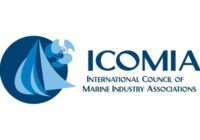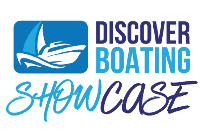From the team at Riviera.
Battery technology recently has been the subject of some discussion online and in the media, particularly regarding lithium batteries. Riviera is renowned around the world not only for the luxury on board Riviera yachts but also for the safety of the systems that are installed. Following careful research, the Riviera team chooses the safest, most stable battery system – Lithium Iron Phosphate.
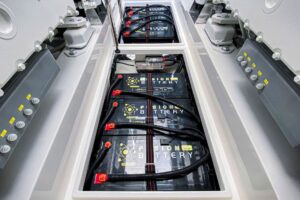
Riviera’s team of engineers selects the best battery technology, Lithium Iron Phosphate, for house batteries to power systems, lights and appliances on board.
Beyond every other consideration, safety is the primary concern for every team member involved in the design, build and testing of any Riviera motor yacht.
Recently battery technology has been the subject of much discussion online and in the media, particularly regarding the safety of lithium-ion batteries following the loss of some marine craft both here and overseas.
Lithium-ion batteries are becoming an ever more popular choice for manufacturers of portable electrical equipment due to the high energy density (more power in a smaller package), greater available depth of discharge, absence of charge memory, quicker charging times, reduction of weight and their extended lifespan.
Lithium-ion technology is proven to be far superior to the now aged flooded lead acid and absorbed glass matt battery technologies that have been the standard in the industry for decades. Gone are the days of battery maintenance, electrolyte top ups, battery bank replacements due to accidental discharge, reduced battery bank capacity due to charging / discharge memory or sulphation.
It is important to understand that Lithium-ion is a term that refers to a type or family of battery that can be manufactured from many different chemistries (see below), all with different performance and safety characteristics:
- Lithium Cobalt Oxide (LiCoO2) LCO
- Lithium Manganese Oxide (LiMn2O4) LMO
- Lithium Nickel Manganese Cobalt Oxide (LiNiMnCoO2) NMC
- Lithium Nickel Cobalt Aluminium Oxide (LiNiCoAlO2) NCA
- Lithium Titanate (Li2TiO3) LTO
- Lithium Iron Phosphate (LiFePO4) LFP
Several incidents have been reported in the media recently where lithium-ion batteries have been identified as the cause of vessel fires.
In most cases, following investigation, it has been determined that one or both of the following has happened:
- A portable piece of battery-operated equipment using a less stable lithium-ion battery chemistry (often Lithium LCO or NCA) such as an electric scooter, mobile phone, laptop, or digital camera has been brought on board and left unattended while being charged for a long period of time resulting in failure. When charging this type of equipment, manufacturer’s instructions must always be followed.
- The vessel system has been modified from a conventional lead acid battery system to a lithium-ion system without design / safety consideration or the person carrying out the work having the necessary experience or qualification.
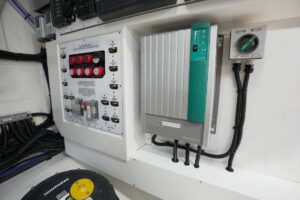
The AC power breaker panel is easily accessed in the engine room. In this instance it is located next to the Mastervolt battery charger system which is installed into Riviera motor yachts.
Being at the forefront of premium yacht manufacturing means using the best and most appropriate equipment and systems. For the ultimate boating experience, Rivieras Electrical Design team has selected the Lithium Iron Phosphate (LiFePO4) battery chemistry for its house battery systems as well as auxiliary battery systems in some newer models.
This chemistry provides exceptional reliability, excellent energy density performance, is accepted industry wide as the most stable and safe type of lithium-Ion battery chemistry with excellent thermal stability and resistance to thermal runaway.
Riviera has selected the Fusion Pulse Lithium-ion range of batteries. These are a professional range of marine specific battery only available to OEM Boat Builders and accredited installers.
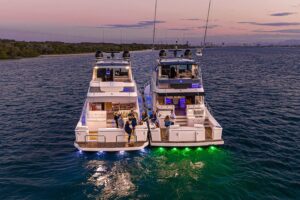
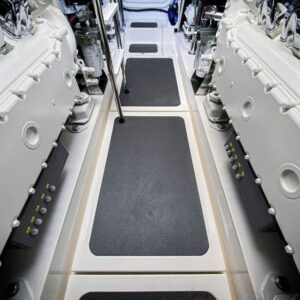
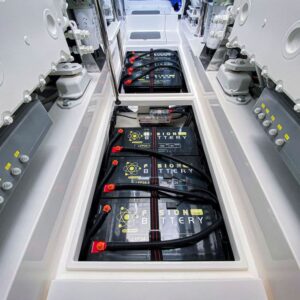
The manufacturer of the Fusion Pulse batteries has carried out extensive destructive testing during the development of their range including burn testing, electrical fault testing, submersion, and physical damage / piercing to the battery case. Under all circumstances, the batteries functioned in accordance with their design parameters and all passed without any safety concerns.
Each battery in the bank contains a Battery Management System (BMS) which constantly monitors voltage, current and temperature during charging, discharging and any fault condition that occurs each cell within the battery. If the BMS identifies an event that is outside of its normal operating parameters, it is designed to disconnect that battery immediately from the electrical system.
Lithium-ion battery banks are approximately 40% lighter than their conventional counterparts and manufacturers advise that their life expectancy now comfortably exceeds eight years. This boost in life expectancy means that lithium batteries would actually save an onwer money over their conventional lead battery arrangement per A/H used over the life of the battery.
A key benefit of this expanded lifespan is also the fact Lithium-ion batteries can be discharged to a greater depth than flooded lead acid batteries without any adverse effects which provides longer periods of quiet vessel use between charging events. Even after the lifespan is used up they are expected to retain 80% of their capacity meaning they will continue to supply power when you may want to replace them instead of losing all your power at once.
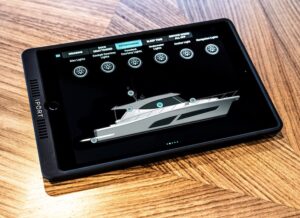
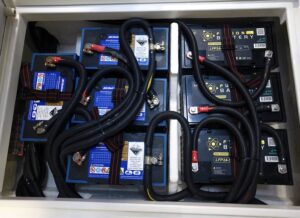
The Riviera team have also tried to take a common sense to owners monitoring of the lithium-ion battery bank capacity, which is displayed on the CZone screens, giving the Owner visibility of the useable power available in 0-100% format so they are aware when they are reaching the safety threshold of the batteries State of Chatge as they move closer to 0% as well as voltage, amps being used, hours of use remaining and warnings when the battery bank capacity gets to 10% and again at 5%.
Another great benefit to Lithium-ion batteries are the charging system profiles that are optimised within the chemicals of the battery and the systems placed onboard a Riviera to return the battery bank to 100% capacity as quickly as possible. Lithium Iron Phosphate batteries are capable of withstanding much greater charge rates which in turn reduces of generator running hours, power loss and fuel costs.
There are those other Lithium Ion batteries to be aware of that may be at the forefront of your mind when using your vessel, such as e-scooters, ocean toys, drones and even tools. When onboard ensure you are charging these in a cool and dry space, this will ensure you are giving those batteries the best opportunity to charge safely. When leaving your boat it’s best not the leave these other batteries on charge without somone to monitor them, it would be at to remove them from the vessel and charge inside your home or leave them onboard not charging.
A lithium battery typically has a 1.2% loss weekly, this means they can sit for a few months without ever losing large amounts of charge, and their repaid charge time means they will quickly charge back when you get back on board, so they are safer to leave away from charge if they cannot be monitored.
Rest assured that with Riviera the right lithium-ion battery technology, when used in conjunction with the additional safety features within Mastervolt and CZone charge and monitoring systems, provides unparalleled performance, safety and peace of mind for Riviera vessel owners.







